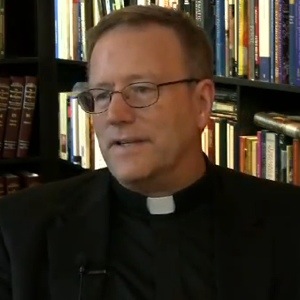Father Robert Barron’s Catholicism project is outstanding. I used it last year to inaugurate a young adults’ group in my parish.
Catholicism could also be adapted to an intensive study course, or some sort of religious instruction programme. I certainly anticipate using it again and again in the years ahead.
Now comes news that Fr Barron has created a sort of sequel: a new DVD series entitled, Catholicism: the New Evangelisation. It was conceived, I think, in response to Pope Benedict’s call for a universal Year of Faith.
I don’t know any details, but I do know that Fr Barron is an outstanding teacher and communicator who is quite different from, but nonetheless invites comparison to, Archbishop Fulton Sheen. On that basis alone, I recommend the new Catholicism series, which I intend to acquire myself as soon as it’s available.
As an added bonus, this trailer for the series was largely filmed in Australia, and amongst many familiar faces, I recognise several readers of this blog!






Have you seen these?
Adam. Now, don’t read it literally. We’re not talking about a literal figure. We’re talking in theological poetry. Adam: the first human being . . .
Sadly, it appears that Fr. Barron is heterodox on this point of the nature of Adam. He can’t deny that Adam was a literal figure and the first man, who fell, without this having dire consequences for the Catholic doctrine of original sin, per Pope Pius XII’s encyclical, Humani Generis (12 August 1950): one that was designed (in the subtitle) to counter “some false opinions threatening to undermine the foundations of Catholic doctrine” (my bolding):
37. When, however, there is question of another conjectural opinion, namely polygenism, the children of the Church by no means enjoy such liberty. For the faithful cannot embrace that opinion which maintains that either after Adam there existed on this earth true men who did not take their origin through natural generation from him as from the first parent of all, or that Adam represents a certain number of first parents. Now it is in no way apparent how such an opinion can be reconciled with that which the sources of revealed truth and the documents of the Teaching Authority of the Church propose with regard to original sin, which proceeds from a sin actually committed by an individual Adam and which, through generation, is passed on to all and is in everyone as his own.[12]
http://socrates58.blogspot.co.uk/2011/09/fr-robert-barron-denies-that-adam-was.html
and
http://blog.adw.org/2012/12/hurts-and-hopes-regarding-the-recent-debates-on-hell/
and
http://www.renewalministries.net/wordpress/?p=348
and
Fr. Barron comments on Hell on YouTube
and
Fr. Barron comments on Is Hell Crowded or Empty? on YouTube
and the fact that he is now rector of one of the largest seminaries in America and teaches the von Balthasarian idea that hell is empty and that a good God would never damn anyone?
Poor Father Barron! It seems that holding two non-literal opinions about the First and Last Things – shrouded by time and death respectively – is enough to take him off the poster-pin-up list (and presumably negate his otherwise traditional appeal).
Jesus, a Jew who probably spoke some Greek as well as Aramaic is often, curiously, resorted to for defending particular English usages and theological ideas and doctrines adopted gradually over centuries.
As a salutary corrective, I found this learned and interesting article. Dr C H H Wright, writes, in “The Protestant Dictionary” (H&S, 1904):
“In the A.V. of the Bible and in many other writings, the word ‘hell’ (which etymologically means simply ‘hollow’; Germ. Hölle, comp. with Höhle, a hollow) is employed in the sense of the invisible world which is the proper meaning of the Greek Hades. In other words it means the place of departed spirits, or the world beyond man’s sight. In the Old Testament the word used is Sheol which properly means the underworld. The word is so employed in Job xxvi.6; Psalm ix, 17; cxxxix, 8; Isaiah xiv, 9; Ezek. Xxxi, 17; xxxii, 21. Similar is its use in Matt. Xi, 23, when it is said of the city of Capernaum “thou shalt be cast down to hell,” or be utterly destroyed. So also even in Luke xvi, 23; Rev. i, 18; xx, 13,14. Hence it is often synonymous with the grave, as in Psalm ix, 17; lv, 15; Proverbs xxvii, 20; Isa. V, 14. In Numb. Xvi, 30-33, Sheol is rendered in the A.V. by ‘the pit’. So in Proverbs v.5; xxiii, 14; &c. In a comparatively small number of passages, the word ‘hell’ in the English version means the ‘place of lost souls’. So Matt. V, 22, 29, 30; x, 28; xxiii, 15, 33; Mark ix, 43, 45, 47; Luke xii, 5; James iii, 6. But in these cases the word in the original is not ‘Hades’ but ‘Gehenna’, or the ‘Gehenna of fire’. Gehenna was originally the same as Gehinnom, or the ‘Valley of Hinnom’, where human sacrifices were offered to Moloch (2 Chron. Xxviii, 3) The valley was defiled by Josiah (2 Kings xxiii, 10) to destroy all idea of sanctity connected with the place, and it was afterwards used as a place of burial (Jer. Vii, 32) Even in earlier times it was used for burial, for it was in that place that the Assyrian soldiers of Sennacherib’s army, who perished before Jerusalem, were buried, and Isaiah refers to that fact in chap. Xxx, 31-33. That valley was called Topheth, which meant ‘a place of burning’ (the dead), or perhaps a ‘place to be spit on, abhorred’. On account of the reference which is made to the Valley of Hinnom in Isaiah lxvi, 24, the word ‘Gehenna’ was popularly employed by the Jews as the name of the place of the future punishment of the ungodly.”
So, what we are dealing with here is a concept of an unholy place, a place without God, from which it would be difficult or impossible to get out (buried, dead, hollow). In fact people can experience what they understand to be a hell, that is a state or place without apparent relief, whether imposed – such as experienced by prisoners in a gulag; or worse – such as a person filled with remorse and knowing their situation is of their own making. Thus ‘hell’ is a concept that makes sense and appears grounded in this temporal life.
But some seem to insist on a populated Doré hell. The Catechism dares not go so far, stating merely that it is a ‘state of definitive self-exclusion from communion with God’.
Can such a state ever be attained by a fallible human? If all that we know about our moral frailty, blindness, chronic self-centredness is true, then how can we ever not want to fill the hunger that these things never assuage? What person, once having tasted the bitter gall of exclusion and exile, would not want it reversed? If mortal sin is the wanting of another god in place of the one God, and if Hell is the loss of the one God and the knowledge of that loss, how could we, in the instant of knowing what we have lost, not want it? And how could then God, a loving Father, and infinite of Mercy (so we hope) not keep the divine hand outstretched in desire and acceptance?
I remember many years ago having this argument in the seminary. (Silly us! How could we possibly say we know any of this stuff?). This is where faith and hope effectively and surely merge into one virtue, or attitude. It is, as a matter of logic, but certainly of hope, not at all necessary that a Hell after death is filled with so much as a single inhabitant. And as much as various classes of people (including relatives and in-laws!) prompt me to wish it were, I also hear the admonition ‘not to judge lest I myself be judged’, and bite my eschatological tongue.
I don’t know Father Barron from a bar of soap apart from these links, but his views on Adam and Hell seem okay to me.
“What person, once having tasted the bitter gall of exclusion and exile, would not want it reversed?”
I reckon you might be surprised.